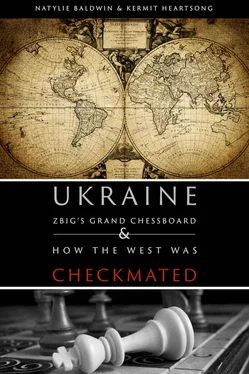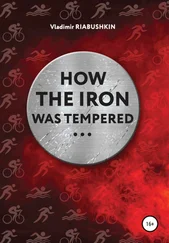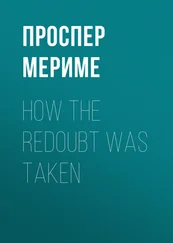Kermit Heartsong - Ukraine - ZBIG's Grand Chess Board & How The West Was Checkmated
Здесь есть возможность читать онлайн «Kermit Heartsong - Ukraine - ZBIG's Grand Chess Board & How The West Was Checkmated» весь текст электронной книги совершенно бесплатно (целиком полную версию без сокращений). В некоторых случаях можно слушать аудио, скачать через торрент в формате fb2 и присутствует краткое содержание. Год выпуска: 2015, Жанр: Политика, на английском языке. Описание произведения, (предисловие) а так же отзывы посетителей доступны на портале библиотеки ЛибКат.
- Название:Ukraine: ZBIG's Grand Chess Board & How The West Was Checkmated
- Автор:
- Жанр:
- Год:2015
- ISBN:нет данных
- Рейтинг книги:4 / 5. Голосов: 1
-
Избранное:Добавить в избранное
- Отзывы:
-
Ваша оценка:
- 80
- 1
- 2
- 3
- 4
- 5
Ukraine: ZBIG's Grand Chess Board & How The West Was Checkmated: краткое содержание, описание и аннотация
Предлагаем к чтению аннотацию, описание, краткое содержание или предисловие (зависит от того, что написал сам автор книги «Ukraine: ZBIG's Grand Chess Board & How The West Was Checkmated»). Если вы не нашли необходимую информацию о книге — напишите в комментариях, мы постараемся отыскать её.
Ukraine: ZBIG's Grand Chess Board & How The West Was Checkmated — читать онлайн бесплатно полную книгу (весь текст) целиком
Ниже представлен текст книги, разбитый по страницам. Система сохранения места последней прочитанной страницы, позволяет с удобством читать онлайн бесплатно книгу «Ukraine: ZBIG's Grand Chess Board & How The West Was Checkmated», без необходимости каждый раз заново искать на чём Вы остановились. Поставьте закладку, и сможете в любой момент перейти на страницу, на которой закончили чтение.
Интервал:
Закладка:
The ideas of “democracy” and “openness” are mere buzzwords that are explicitly connected to the economic interests of those who created the globalization project….The main focus of Western capital is that “openness” becomes universally conflated with cultural and ideological standardization. “Democracy” can then become universally conflated with securing the maximum return on investment. (Johnson 2014)
What Johnson is touching on here is the fact that there is nothing that Western elites fear and disdain more than authentic and substantive democracy — not the perversion of the term that they have created in which it is conveniently equated with liberalized markets whereby they can exploit everyone’s resources for their own benefit, combined with dog and pony show elections where most of the candidates are pre-approved by the elites in order to provide a pretense of political democracy.
This is reflected in the US’s characterization of Yeltsin as a “democrat” on one hand, and shrieks about or distortions of every little thing Putin does that they don’t approve of — and the stated reasons for disapproval are often not the actual ones — on the other hand. It is also tragically reflected in a review of post-WWII US foreign policy, in which democracy is reduced to a mere annoyance, as when Iranians freely elected Mohammad Mossadegh but the US/UK saw fit to overthrow him in 1953 for the crime of wanting to nationalize the fossil fuel industry so its proceeds could benefit the Iranian people rather than foreign corporations. As a replacement, they installed the brutal Shah as dictator. A similar scenario played out the following year when the democratically elected leader of Guatemala, Jacobo Arbenz Guzman, was overthrown in a CIA-backed coup after nationalizing agricultural land, including that owned by the American corporation, United Fruit Company (Risen 2000; Kornbluh and Doyle).
Johnson also points out that neoliberal capitalists implicitly believe that a country should have no “national interest” separate from those of Western capital, such as national independence, stability, or social justice.
By 2006, Putin had made it clear that foreign investment in Russia would have limitations and conditions placed upon it — namely, that such investment must be beneficial to the Russian people rather than exploitive and that it must not undermine the security or independence of Russia. This was exemplified in moves that year by the Russian government to regain control of oil and gas deposits that had been virtually given away by Yeltsin under Production Sharing Agreements to Exxon Mobil and Royal Dutch Shell (Engdahl 2006).
Putin had shown this inclination three years earlier when he had Mikhail Khodorkovsky arrested and jailed for tax evasion. However, tax evasion was merely the tip of the iceberg in terms of what this recalcitrant oligarch, who ran Yukos Oil, was in the midst of trying to pull off.
At the time of Khodorkovsky's arrest at Novosibirsk airport in October of 2003, he had succeeded in buying a huge number of votes in the Duma four weeks prior to elections. Having control of Russia's legislature would have allowed him to alter laws whereby he could effectively seize control of Russian oil and gas deposits and pipelines. Furthermore, he could have legislation passed that would position him for the Russian presidency.
Additionally, Khodorkovsky was colluding with Dick Cheney and other powerful players in the US to sell a stake ranging from 25 to 40 percent in Yukos to Exxon Mobil and Chevron, giving the US major influence over decisions relating to Russian fossil fuel resources, the engine of the country's economic growth and recovery. The final details of the sale were set to be ironed out when Putin intervened.
Of course, Khodorkovsky's cadre of friends in the West, like NATO enlargement cheerleader/war profiteer Bruce Jackson, George Soros, and Stuart Eizenstat — who had worked in the Treasury Department during the Clinton administration, representing the halcyon years for the oligarchs pillaging Russia's assets — immediately set up a PR campaign characterizing the Putin government as the bad guys bullying an innocent “dissident” oligarch who only yearned for Western style democracy. A major lobbying effort to get Khodorkovsky freed was undertaken, but the Russians were not in a forgiving mood (Engdahl 2006; Clark 2003).
It appears that the concept of a Eurasian (Economic) Union represents Putin’s attempt to integrate the benefits of global markets without compromising other important interests like maintenance of sovereignty and regulation of economic relations to prevent or counter major imbalances that can lead to destabilization and dangerous levels of social inequality. The common market space it encompasses, at least initially, was comprised of two nations on Russia’s borders, Belarus and Kazakhstan, which have long-standing historical, geographic and ethno-cultural ties. It is gradually expanding to include other nearby nations, such as its newest member Armenia, and Kyrgyzstan, which will be following suit in 2015. This trend will only increase if it demonstrates a successful and appealing model. Russia had been in discussions regarding potential membership with Ukraine during Yanukovych’s leadership — a move that Yanukovych was open to as long as it didn’t preclude Ukraine’s being integrated also with the EU (Bespalova 2013).
The fact that Ukraine might have joined the Eurasian Union and that a successful Eurasian Union might one day link up to the EU was an especially upsetting thought in the minds of US elites.
Putin has consistently made the connection between stability and security with social justice and equitable development. For example, during his speech before the Munich Conference on Security Policy in 2007:
And there is still one more important theme that directly affects global security. Today many talk about the struggle against poverty. What is actually happening in this sphere? On the one hand, financial resources are allocated for programmes to help the world's poorest countries — and at times substantial financial resources. But to be honest — and many here also know this — linked with the development of that same donor country's companies. And on the other hand, developed countries simultaneously keep their agricultural subsidies and limit some countries' access to high-tech products.
And let's say things as they are — one hand distributes charitable help and the other hand not only preserves economic backwardness but also reaps the profits thereof. The increasing social tension in depressed regions inevitably results in the growth of radicalism, extremism, feeds terrorism and local conflicts. And if all this happens in, shall we say, a region such as the Middle East where there is increasingly the sense that the world at large is unfair, then there is the risk of global destabilization. (Putin 2007)
In discussing various aspects of the financial crisis that had recently affected the world at the Davos Economic Forum in 2009, Putin again addressed these interconnections by discussing the untenable levels of inequality the crisis had laid bare:
The benefits that were generated were distributed very disproportionately. In fact, such disproportions could be seen between layers of the population in individual countries and even in highly developed countries, as well as between different countries and regions of the world.
For a significant part of mankind, comfortable housing, education and qualit[y] medical care are still inaccessible. And the world upsurge of recent years has not radically changed this. (Putin 2009)
Putin has continued to encourage policies in Russia that acknowledge social responsibility. In his 2013 Address to the Federal Assembly, he outlined plans to raise salaries for teachers, professors, and doctors and for investment in affordable housing construction with the requisite social infrastructure for middle-income families (Putin 2013).
Читать дальшеИнтервал:
Закладка:
Похожие книги на «Ukraine: ZBIG's Grand Chess Board & How The West Was Checkmated»
Представляем Вашему вниманию похожие книги на «Ukraine: ZBIG's Grand Chess Board & How The West Was Checkmated» списком для выбора. Мы отобрали схожую по названию и смыслу литературу в надежде предоставить читателям больше вариантов отыскать новые, интересные, ещё непрочитанные произведения.
Обсуждение, отзывы о книге «Ukraine: ZBIG's Grand Chess Board & How The West Was Checkmated» и просто собственные мнения читателей. Оставьте ваши комментарии, напишите, что Вы думаете о произведении, его смысле или главных героях. Укажите что конкретно понравилось, а что нет, и почему Вы так считаете.











